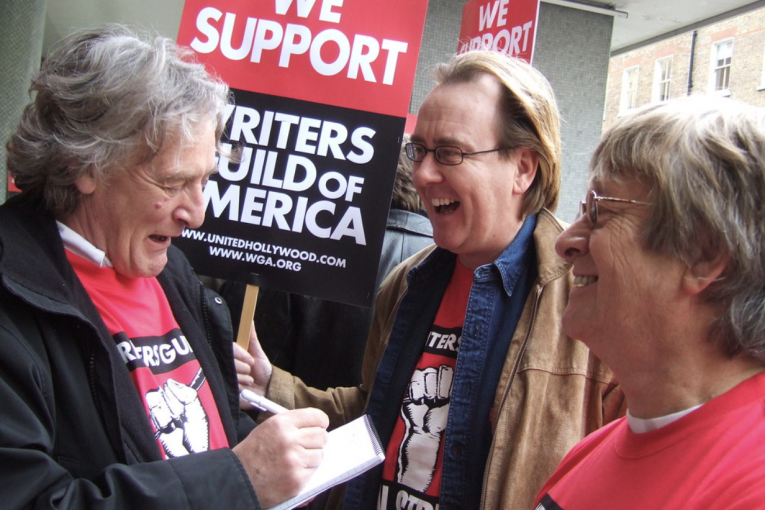
![]()
By: Ariana Ceballos
Undoubtedly, the TV industry has played a huge role in many of our daily lives. We all have a show we rave about to our friends—shows we watch, binge, laugh, cry, and interact with constantly. But what causes or contributes to creating these memorable and strong responses? It’s largely a result of good screenwriting.
While we may be brought to watch a show due to its studio, elaborate promotion, or recommendations from friends, we stay for good screenwriting, which involves the work of many talented writers. But it seems that entertainment studios are not understanding the importance of their roles.
On May 2, 2023, many Hollywood writers within the Writers Guild of America (WGA), a labor union for many workers in the entertainment industry, began a strike. Irina Vanova, writer for CBS News, lists the media companies in which WGA are in negotiations as including, “Amazon, Apple, Disney, Warner Bros. Discovery, NBC Universal, Netflix, Paramount and Sony… (CBS News and Paramount+ are owned by Paramount Global).”
These global media companies are represented by the Alliance of Motion Picture and Television Producers (AMPTP). They are well-established and home to many of our favorite pieces of media. They invest millions of dollars on production and advertisement, but writers are not given fair compensation for their work towards this production, which they are the very foundation of.
As Vanova summarizes the struggle, explaining that “At the core of the dispute is the explosion in streaming services and its effects, including the erosion of writers’ pay and job security, according to the WGA.” Streaming has made many forms of entertainment accessible and allowed for many new shows to be given a platform. These are the benefits we as an audience get to see, but there is a downfall for the people that upkeep these shows. As shows increasingly receive more ludicrous funding, writers get back a significantly reduced amount of money.
Vanova continues on the unfairness, saying: “Streaming services use smaller writing staffs, which the industry calls ‘mini rooms’… tend to have shorter seasons than broadcast shows… That leaves some writers scrambling to put together several sources of income in a single season.” The WGA Strike is giving us an insight into struggles that occur behind the camera of our favorite shows as people are struggling to keep a secure income despite working on popular and demanding productions.
While these struggles are hard to see through a screen, Linda Holmes for NPR writes on ‘ethical consumption and entertainment,’ implying that viewers should take into account their consumption of media as “working conditions of the place where your clothes are made or your food is produced, it’s reasonable to care about the working conditions of a show or a movie that you pay to see.”
We should focus on the production of entertainment to consider the efforts and struggles of many people behind the scenes. More significantly, these people behind the camera are more similar to us through their struggles in their working lives than the people we see on our screens.
Many late-night talk shows followed suit with the writers on strike, those being, “CBS’s The Late Show with Stephen Colbert, ABC’s Jimmy Kimmel Live!, NBC’s The Tonight Show with Jimmy Fallon, and Late Night with Seth Meyers,” all of which stopped production, resulting in the airing of reruns.
The stars of these shows are willingly aiding and advocating for these writers, something their bigger employers are not willing to do. On the Monday before the strike, Seth Meyers gave attention to the effort on his show before halting production, saying, “No one is entitled to a job in show business, but for those who have a job in show business, they are entitled to fair compensation… They’re entitled to make a living…I think it’s a very reasonable demand that’s being set out by the Guild, and I support those demands.”
It is important to note that the last writer’s strike happened in November of 2007, lasting 100 days. The landscape of television has drastically changed since then, thanks in part to the audience, streaming, and most notably, the writers. They produce a form of escape from our everyday struggles, despite them undergoing their own challenges within the industry. It is important to shed light on this cause. As an audience dedicates time to watch the creations of these writers, they should also pay the same attention to all the work that gets done in the background.